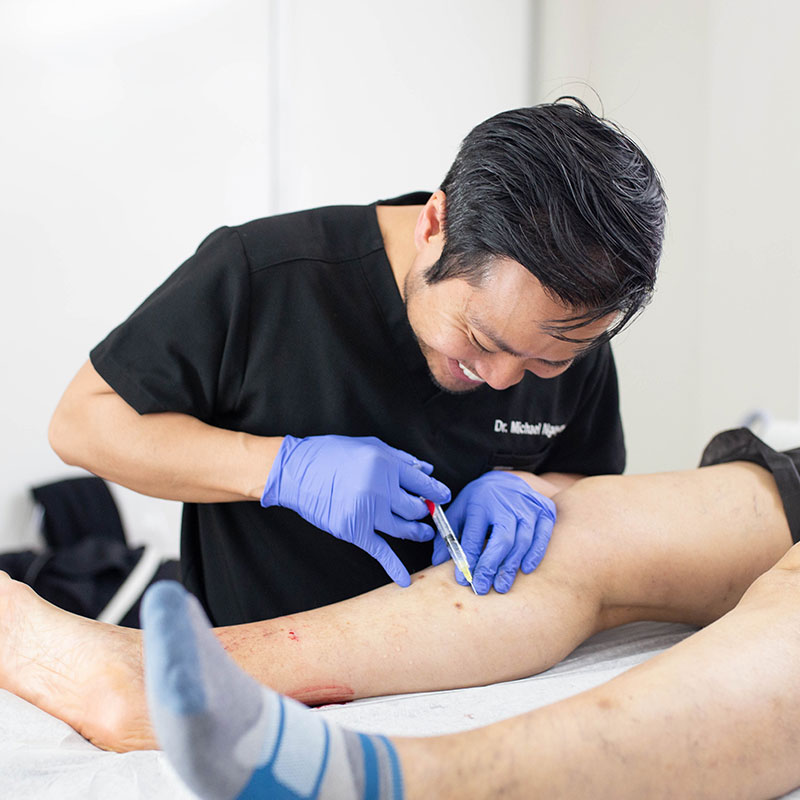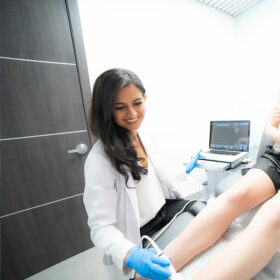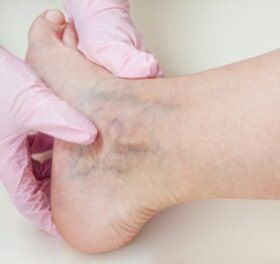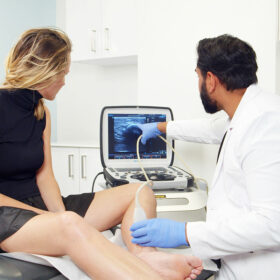If you’re dealing with the discomfort and unsightly appearance of varicose veins, you may be considering varicose vein surgery as a potential solution. However, before you make a decision, it’s essential to weigh the pros and cons carefully. At Vein Treatment Clinic, we’re committed to providing you with the most comprehensive information to help you make an informed choice. In this article, we will explore the advantages and disadvantages of varicose vein surgery, as well as alternative minimally invasive treatments that we recommend.
Varicose Vein Surgery: The Obsolete Option
Varicose vein surgery, also known as vein stripping or ligation, is a surgical procedure designed to treat severe cases of varicose veins. These bulging, twisted veins are often the result of damaged or weakened valves within the veins, causing blood to pool and lead to various symptoms, such as pain, swelling, and discomfort.
During varicose vein surgery, a surgeon makes incisions in the affected area, typically the leg, and then physically removes the problematic vein. This procedure aims to eliminate the source of the issue, which is the malfunctioning vein. The surgery is performed under general or regional anesthesia, rendering the patient unconscious or numbing the targeted area. After the removal of the problematic vein, the incisions are stitched up, and the recovery process begins.
An Obsolete Form of Vein Treatment
Varicose vein surgery, once regarded as the gold standard in addressing varicose veins, is now considered an obsolete form of vein treatment in many cases. While it may have been the go-to option in the past, medical advancements have paved the way for more patient-friendly and effective alternatives. The drawbacks associated with vein surgery, such as its invasiveness, extended recovery times, and potential complications, have led many patients and physicians to seek out modern, minimally invasive vein treatments.
With the advent of procedures like endovenous laser ablation (EVLA), radiofrequency ablation (RFA), VenaSeal, ClariVein, and ambulatory phlebectomy, patients can now experience quicker recoveries, minimal scarring, and lower risks of complications. These state-of-the-art techniques not only treat varicose veins but also address the underlying cause of chronic venous insufficiency (CVI), offering a more comprehensive and lasting solution. As a result, varicose vein surgery has lost its luster and is often reserved for cases where alternative treatments may not be suitable or fail to yield the desired results.
The Pros of Varicose Vein Surgery:
- Effective Removal: Varicose vein surgery, also known as vein stripping or ligation, is a well-established procedure that effectively removes problematic varicose veins. It targets the underlying issue, eliminating the damaged vein from your circulation.
- Immediate Relief: Varicose vein surgery can provide immediate relief from the discomfort associated with varicose veins. Once the problematic vein is removed, the symptoms, such as pain and swelling, often subside.
- Historical Gold Standard: Historically, varicose vein surgery has been considered the gold standard for treating severe cases of varicose veins when other methods proved ineffective.
- Long-Term Results: Varicose vein surgery can provide long-lasting results, reducing the likelihood of varicose veins recurring in the treated area.
The Cons of Varicose Vein Surgery:
- Invasiveness: Varicose vein surgery is an invasive procedure that requires incisions, which can lead to scarring. It also involves general or regional anesthesia, increasing the risk associated with any surgical procedure.
- Downtime: Recovery after surgery can be extensive, with patients experiencing discomfort, bruising, and swelling for several weeks. This can disrupt your daily life and activities.
- Risk of Complications: Like any surgery, varicose vein surgery carries inherent risks, including infection, bleeding, and adverse reactions to anesthesia. Additionally, there’s a risk of deep vein thrombosis (DVT) and the development of scar tissue.
- Limited Treatment Scope: Surgery primarily targets larger varicose veins and may not address smaller spider veins or the underlying issue of chronic venous insufficiency (CVI).
- Recurrence: While surgery can provide long-term relief, it does not guarantee that new varicose veins won’t develop in other areas.
Minimally Invasive Vein Treatments: A Better Option
Minimally invasive vein treatments have revolutionized the field of vascular medicine, offering patients a more comfortable and effective way to address varicose veins and related issues. These advanced techniques are designed to target the root causes of vein problems while minimizing the drawbacks associated with traditional surgery. At Vein Treatment Clinic, we prioritize these minimally invasive options for our patients, ensuring they receive state-of-the-art care with exceptional results.
Minimally invasive vein treatments, such as endovenous laser ablation (EVLA), radiofrequency ablation (RFA), VenaSeal, ClariVein, and ambulatory phlebectomy, involve smaller incisions or no incisions at all compared to surgery. These procedures are typically performed under local anesthesia, reducing the risks associated with general anesthesia. Patients experience minimal discomfort, shorter recovery times, and fewer complications. Moreover, these treatments are highly effective in eliminating varicose veins and addressing the underlying chronic venous insufficiency (CVI), ensuring comprehensive and long-lasting results.
The Pros of Minimally Invasive Vein Treatments:
- No General Anesthesia: Minimally invasive vein treatments, such as endovenous laser ablation (EVLA) and radiofrequency ablation (RFA), are performed under local anesthesia, reducing the risks associated with general anesthesia.
- Quick Recovery: Minimally invasive procedures typically have shorter recovery times, allowing you to return to your regular activities sooner. Most patients experience minimal discomfort, bruising, and swelling after the treatment.
- Minimal Scarring: These procedures involve tiny incisions or no incisions at all, resulting in minimal scarring compared to traditional surgery.
- Comprehensive Treatment: Minimally invasive treatments can address both the visible varicose veins and the underlying cause, CVI, ensuring a more lasting solution.
- Lower Risk of Complications: With a reduced risk of infection, bleeding, and DVT, minimally invasive treatments are considered safer options.
- Customized Treatment Plans: We always perform a thorough duplex ultrasound to diagnose the root cause of your vein issues, allowing us to create a personalized treatment plan tailored to your specific needs.
- Insurance Coverage: Most insurance plans cover minimally invasive vein treatments deemed medically necessary, such as radiofrequency ablation and endovenous laser ablation. Vein Treatment Clinic also offers hassle-free insurance verification.
The Cons of Minimally Invasive Vein Treatments:
- Cost Considerations: Depending on your insurance coverage and specific treatment, minimally invasive procedures can be expensive. Some of the latest minimally invasive treatments, like VenaSeal, aren’t covered by all insurance plans. It’s important to discuss costs and insurance coverage with your vein doctor.
- Potential Side Effects: Although rare, minimally invasive treatments can still carry risks, including infection, nerve damage, or allergic reactions to anesthesia or medications.
- Follow-Up Appointments: Most patients require follow-up appointments to monitor their progress and ensure the treatment’s success. These visits may add to the overall time.
- Temporary Discomfort: Some discomfort, bruising, or swelling is common after minimally invasive procedures, but these side effects are typically mild and short-lived.
Vein Treatment FAQs
Are minimally invasive vein treatments painful?
Minimally invasive procedures are typically well-tolerated and involve minimal discomfort. Local anesthesia is used to numb the treatment area, making the experience relatively pain-free. Most patients report only mild sensations of pressure or warmth during the procedure.
How long is the recovery period for minimally invasive treatments?
Recovery times can vary depending on the specific procedure and individual factors. However, most patients can resume their normal activities immediately after treatment. You may be advised to avoid strenuous exercise for a short period, but downtime is minimal.
Will insurance cover the cost of minimally invasive vein treatments?
Insurance coverage can vary based on your provider, your specific plan, and the medical necessity of the treatment. Our vein clinic offers hassle-free insurance verification to help you understand your coverage and any potential out-of-pocket expenses.
Can minimally invasive treatments address both varicose and spider veins?
Yes, many minimally invasive treatments can effectively target both varicose and spider veins. These procedures not only improve the appearance of visible veins but also address the underlying cause of chronic venous insufficiency (CVI).
Are minimally invasive treatments safe for older individuals or those with underlying health conditions?
Minimally invasive treatments are generally safe for a wide range of patients. However, it’s essential to discuss your medical history and any underlying health conditions with your vein specialist to ensure the most appropriate treatment plan for your unique needs.
How can I schedule a consultation at Vein Treatment Clinic?
Scheduling a consultation with our board-certified vein doctors is easy. Simply contact our vein clinic, and our friendly staff will assist you in setting up an appointment at one of our state-of-the-art locations across the United States.
Choose Minimally Invasive Vein Treatments
While varicose vein surgery has been a traditional method for varicose veins, it is essential to weigh the pros and cons. The invasiveness, longer recovery times, and risks associated with surgery make minimally invasive treatments a more appealing and effective option.
At Vein Treatment Clinic, our board-certified vein doctors specialize in minimally invasive vein treatments, ensuring you receive state-of-the-art care with minimal discomfort and downtime. We encourage you to explore these advanced treatments before committing to surgery, as they offer a safer, less invasive, and more comprehensive solution for your varicose vein concerns. Vein Treatment Clinic has state-of-the-art medical centers for vein treatment in New York, New Jersey, California, and Washington DC. If you’re in New York City, you can find our vein clinics near the iconic Empire State Building or in the Financial District.
Don’t let varicose veins disrupt your life or cause unnecessary discomfort. Contact Vein Treatment Clinic to schedule your consultation, and let us help you find the right solution for your vein issues. We are committed to providing you with the best care possible.











